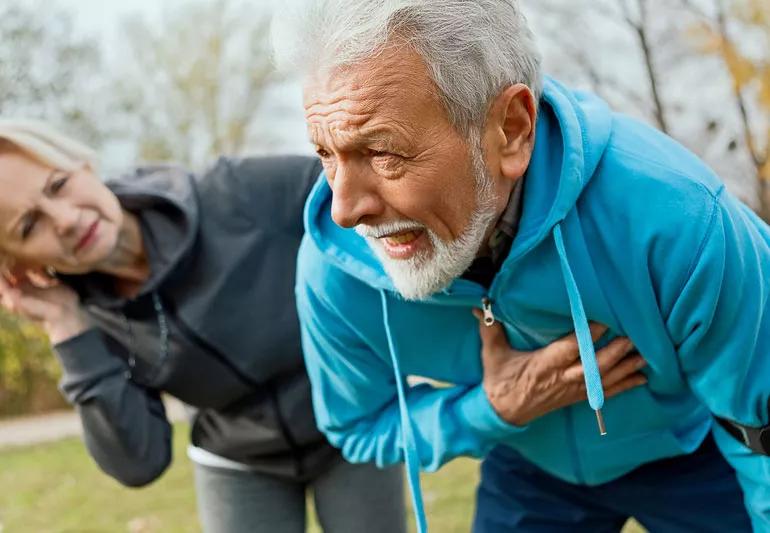It happens when the LAD artery is blocked

Image content: This image is available to view online.
View image online (https://assets.clevelandclinic.org/transform/2b5691ae-9255-459f-92df-587f3685c24d/widowmaker-1070043086-770x553_jpg)
Older man having heart attack
Any heart attack can be fatal. But one particular kind has earned notoriety and a scary-sounding nickname because it is especially dangerous.
Advertisement
Cleveland Clinic is a non-profit academic medical center. Advertising on our site helps support our mission. We do not endorse non-Cleveland Clinic products or services. Policy
You may have heard of the so-called “widowmaker” heart attack in the news or on a TV show. But what is it, and why is it called that? The answer starts with the particular artery that it affects.
There are three main arteries in the heart — one on the right side and two on the left side. (In case you need a refresher, the coronary arteries carry blood to all the regions of the heart to keep the muscle pumping faithfully.)
Heart attacks occur when blood clots form around plaque that builds on the walls of one or more of those arteries, blocking blood from flowing.
“If there’s no blood flow to the heart, the heart muscles become deprived of oxygen and vital nutrients and heart muscle damage starts immediately,” says cardiologist Penelope Rampersad, MD, MSc, FRCPC.
That’s what causes those classic heart attack symptoms like shortness of breath; cold sweats; and severe chest pain, tightness or pressure.
A widowmaker heart attack occurs when the left anterior descending (LAD) artery, which supplies blood to the larger, front part of the heart, is blocked at its origin.
“This artery delivers a major amount of blood to your heart,” Dr. Rampersad explains.
Because it serves such a big portion of the heart, the LAD artery is a particularly dangerous place to get a clot. A lot of damage can be done to the heart muscle if blood flow isn’t restored quickly.
Advertisement
But, you can’t tell that someone is having a widowmaker heart attack from the outside. It causes the same symptoms as a heart attack caused by a blockage in a different artery, including chest pain, chest heaviness, shortness of breath, lightheadedness and cold sweats. In women, the symptoms can be more subtle, like neck or jaw pain, nausea and lightheadedness.
What you should always do when you see someone having a heart attack – or if you think you might be having one yourself – is to get help immediately.
Every minute matters when someone’s having a heart attack. The longer blood isn’t reaching certain parts of their heart, the more the muscle will be damaged. The quickest way to get help is to call 911 – not to drive to the emergency room.
That’s because paramedics can begin diagnostics and treatment with clot-dissolving drugs en route, as well as feed information to the team at the hospital to help them prepare for the patient’s arrival.
“If the electrical system of the heart is affected, you might also experience rhythm problems,” Dr. Rampersad explains. “Defibrillation might be necessary, and that’s another reason why it’s best to call the paramedics.”
At the hospital, interventional cardiologists will determine where the blockage is and clear it using angioplasty and stenting, or bypass surgery.
Survival rates following a heart attack have improved in recent years; overall, nearly 90% of people who have a heart attack survive, according to the latest statistics from the American Heart Association.
The heart is resilient and might recover from a major heart attack like a widowmaker. Patients sometimes are released from the hospital within a few days — especially if they sought medical attention promptly and the cardiologists were able to open the blockages very early.
Sometimes, based on the extent of damage, the heart will heal by forming scar tissue, which doesn’t pump as well as healthy tissue.
When it comes to any kind of heart attack, “the best thing is prevention,” Dr. Rampersad says.
This means keeping your risk as low as possible by not smoking, being active, eating a heart-healthy diet and maintaining good sleep habits. It also means keeping conditions like diabetes, hypertension or high cholesterol under control.
If you experience any kind of chest pain, tell your doctor. It could be caused by a number of things, but it could also be an early sign of a heart problem.
Advertisement

Delivered every Tuesday!
Sign up for our Health Essentials emails for expert guidance on nutrition, fitness, sleep, skin care and more
It's a letter about the news!
Learn more about our editorial process.
Advertisement
Most recommended precautions center around minimizing bruising or swelling
Even one drink can have an impact on your cognitive function leading to slurred speech, blurred vision and impaired memory
Understand who may (and may not) benefit
Lorem ipsum dolor sit amet. Et odio Quis vel ipsam omnis eum alias deleniti et placeat impedit non voluptas galisum hic autem enim et cupiditate aliquid. Est beatae quidem non facilis autem ut commodi nisi aut tempore rerum et dolores voluptatem cum enim optio id sapiente quasi. Ad laboriosam officiis 33 cupiditate sequi ea voluptatum consectetur qui necessitatibus voluptate et quasi doloremque et facere explicabo quo explicabo officia
Seeking help through therapy can be an important step in improving your quality of life when you have UC
Type 2 diabetes isn’t inevitable with these dietary changes
Applying a hot or cold compress can help with pain
Pump up your iron intake with foods like tuna, tofu and turkey